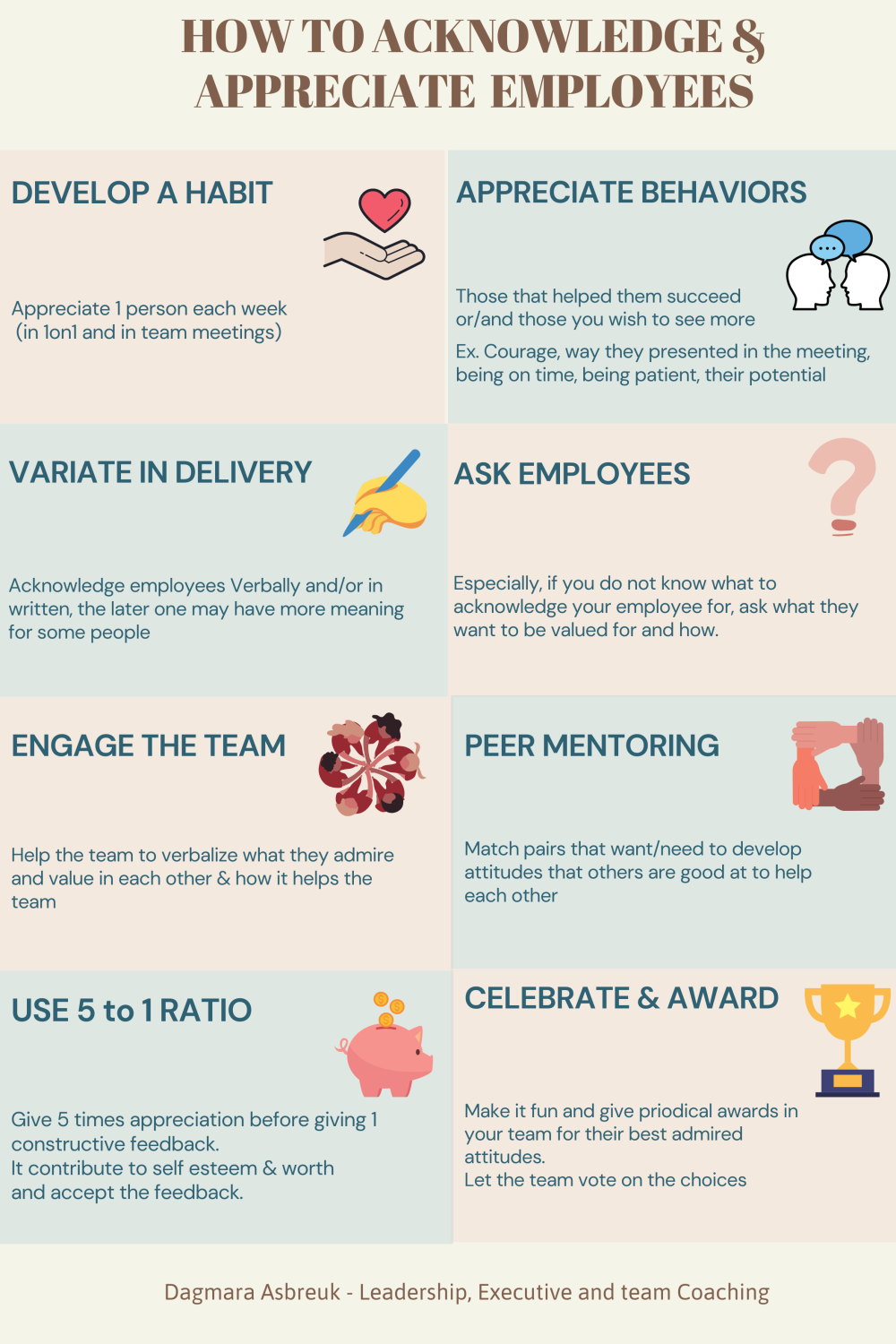Create an empowering culture
Sep 28, 2022
How and how often you appreciate your employee's matters for the engagement, fulfillment and performance of your members. It's one source of inspiration.
In most of the leadership courses, one of the key skills we equip leaders with is giving constructive feedback. While this skill is super important and can make or break the motivation and relationship with your team members, equally important and less focused on is the skill of appreciating your team members.
Also, interesting fact is that the more your employees feel appreciated the more open they will be for constructive feedback.
So, what is the challenge in giving appreciation, you would ask?
There are at least 5 pitfalls leaders fall into:
- Acknowledging results only
- Using general statements such as: 'Well done, ‘Good job, ‘Nice work, which is superficial and it does not help the person to know what that person does well and could build on.
- Appreciating employees only at annual appraisal
- Treating appreciation as a checklist without showing you care - appears fake
- Not verbalizing appreciation to employees
We need to learn how to appreciate our members in a way that is constructive because it’s essential for organization heath, people's fullfillment and performance.
Therefore, I would like you to know that:
- all human beings want to be seen, feel valued, and appreciated
- employees want to know what value they bring
- appreciating attitudes and behaviors that you value inspires people to do more of it
- people want to know they & their work matters
- it builds on personal worth
Since it's so powerful, why do leaders minimalize it or appreciate it not effectively today?
To answer that I will share with you my OWN STORY.
At the beginning of leading teams, I was focusing more on constructive feedback and continuous improvement than giving appreciation, it was also in line with the company culture I was in. Behind this focus lies a genuinely good intention to help people to develop and be their best selves, as well as general continuous improvement of things to be greater as a company and human being. It turned however to a blinding obsession, and I forgot to pay attention on appreciating all the good aspects people and company already had. Not surprisingly, I was looking at myself in the same way, taking all good behaviors and attitudes for granted and working on improvements. I was very lucky that very early on in my leading journey a member of my team told me that she felt not valued. This shocking event invited me to evaluate the impact of my behaviors and contributed to starting a new habit of appreciating others and myself to balance it with feedback. Also, I was working that time with a coach and it helped me to identify the root causes that held me back from seeing the good in others and myself, which I transformed. All that supported me in becoming a leader that put appreciation of own members as an important part of leading.
So my KEY LEARNINGS from these experiences were:
How much we appreciate self and others depends on how we experienced appreciation or lack of it in a childhood, and what we belief about it and ourselves
Taking a coach on this journey to self-explore your way of thinking and transform it, will support you to build an appreciation of habit and culture.
Our brain is wired for negativity - we lean in more naturally to think negatively, having a negative self-talk, criticizing ourselves and others, focus more on gaps in business
We need to develop a mindful habit of appreciation and have more leaders who can role model effective appreciation of employees to encourage it.
Here below are my tips for you on where you can start to transform to an inspiring leader that builds a culture of appreciation:

Wishing you lots of fun trying them out!
Also, I recommend checking out the book 'The 5 languages of appreciation in the workplace: Empowering Organizations by Encouraging People' by Gary Champman. This will help you to understand 5 different ways people like to be appreciated and identify which one fits whom in your team. You will also learn about your own preference.
Looking forward to hearing how this article resonates with you, what you are going to try, what are your lesson learned, and how you see your culture transforms.
STAY CONNECTED
Join my mailing list to receive weekly tips, inspiration, and industry highlights.
Submit
